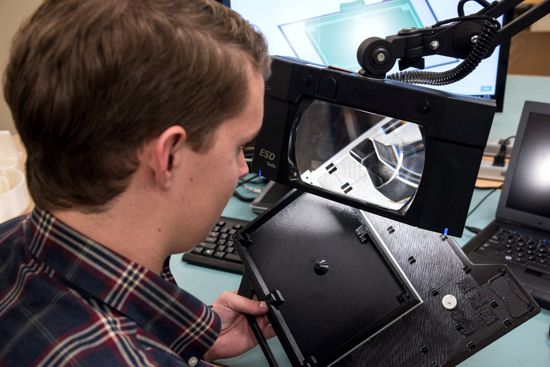Advanced Manufacturing Finds Home in Pleasanton and Tri-Valley
Advanced Manufacturing Finds Home in Pleasanton and Tri-Valley

In 1953, nearly one in three working Americans held a job in manufacturing. After the end of the Korean War, manufacturing as a share of the overall workforce began to drop. What was first a gradual decline in US manufacturing jobs became a sharp drop after 2000. Today only 8.5% of US workers are employed in manufacturing, according to the Bureau of Labor Statistics. As a result, some may be surprised to learn that American manufacturing is anything but dying.
"Manufacturing is far from gone," says Gene Russell, President and CEO of The Corporation for Manufacturing Excellence, or Manex. Moreover, "California is the largest manufacturing state in the United States. In terms of total number of manufacturers, California leads the way."
In February 2018, there were an estimated 12.6 million American manufacturing jobs, an increase of more than 1 million since manufacturing jobs hit a historic low in early 2010. While manufacturing is not expected to become as large a segment of the US economy as it once was, manufacturing is still vitally important to a host of regions, particularly as the nature of manufacturing changes. Some refer to these collective changes as advanced manufacturing, or "maker tech." Some call it Manufacturing 4.0 or Industry 4.0.
The Future of Manufacturing
As McKinsey & Company defines it, Industry 4.0 is "the next phase in the digitization of the manufacturing sector, driven by four disruptions: the astonishing rise in data volumes, computational power, and connectivity, especially new low-power wide-area networks; the emergence of analytics and business-intelligence capabilities; new forms of human-machine interaction such as touch interfaces and augmented-reality systems; and improvements in transferring digital instructions to the physical world, such as advanced robotics and 3D printing."
Industry 4.0 is considered by many the fourth industrial revolution. The resources needed for companies working within Industry 4.0 make the greater Bay Area, the Tri-Valley region, and Pleasanton in particular an especially good fit for the development and growth of advanced manufacturing companies.
UC Berkeley, for example, produces more PhDs in synthetic biology than any other institution in the world. Local private industry can also take advantage of the rich resources offered by Lawrence Livermore National Laboratory and Sandia National Laboratories through the Livermore Valley Open Campus. Pleasanton and the Tri-Valley region boast a highly educated workforce, relatively affordable housing and office space, ample access to public transit,nand easy freeway access. So perhaps it is unsurprising that the Bay Area is the largest biomedical manufacturing region in the US, and that a host of biomedical device manufacturers have already found a home in Pleasanton.
According to Manex, a private, non-profit corporation established in 1995 to provide services to small and mid-size manufacturers in Northern California, growth industries for Pleasanton manufacturing include high tech medical devices, surgical and medical instruments, and 3D-related businesses. Several existing companies in these areas, as well as companies involved in pharmacology, automation/robotics, and optics manufacturing, have headquarters or offices at Hacienda.
One such company is IntegenX, which has its headquarters at Hacienda. IntegenX has become the market leader of Rapid DNA technology for human identification in forensics and law enforcement applications. Its RapidHIT technologies integrate advanced fluidics, optics, and biochemistry capabilities to produce sample-to-answer solutions for DNA-based human identity testing.
Another is Roche Molecular Diagnostics (RMD), which is also headquartered at Hacienda. RMD is a business area of Switzerland-based Roche Diagnostics that develops, manufactures, and supplies a wide array of innovative medical diagnostic products, services, tests, platforms, and technologies. While Roche is huge, startups are also making their mark. Hacienda-based XIP Diagnostics has developed a unique technology that enables medical professionals to measure the constituents in a drop of whole blood rapidly and accurately using a single-use, digital-read, match-book-size device.
Pleasanton Looks Ahead
The future of manufacturing growth for the Tri-Valley depends on elements of Manufacturing 4.0, according to Russell. These elements include automation, the Internet of Things, 3D printing, and the appropriate use of big data from those tools.
In 2017, the City of Pleasanton joined the Bay Area Urban Manufacturing Initiative. This limited-term project includes 30 Bay Area cities working together to facilitate the creation of a well-defined and interconnected regional manufacturing ecosystem. In response to becoming a member of the initiative, the City of Pleasanton's Director of Economic Development, Pamela Ott, examined city business licenses to determine how many manufacturers existed in Pleasanton.
"There are companies doing really interesting, valuable, and significant work here in Pleasanton," says Ott, who counted nearly 90 manufacturers within the city. "We have a nice complement of growing small to medium size biotech firms in Pleasanton and see more entering our city. We have the right kind of space, we have the right kind of workers, and we have an ideal location."
Ott points out that Pleasanton has many manufacturers outside of the biotech area, and each manufacturer is a valuable contributor to the city and its economy. According to Manex, Pleasanton manufacturers include dental laboratories, sign manufacturers, printers, machine shops, manufacturers of electronics, and navigation equipment makers. A local contract manufacturer is an important part of the local manufacturing ecosystem as well, notes Ott, since that company builds prototypes for other companies not yet large enough to make their own.
ZELTIQ Aesthetics is an example of a medical technology company that started in Pleasanton and successfully developed a popular, proprietary technology (a controlled-cooling fat reducing treatment called CoolSculpting). After being successfully acquired by Allergan, the company moved into an office in Hacienda rather than leaving the area. That is the kind of success story Ott enjoys.
"Our goal is to create an environment where companies can start in Pleasanton, grow in Pleasanton, and stay in Pleasanton," she says.
For more information about The Corporation for Manufacturing Excellence, please visit www.manexconsulting.com.
For more information about the City of Pleasanton's Office of Economic Development, please visit www.cityofpleasantonca.gov/gov/depts/ed/default.asp.
For more information about Hacienda, please visit www.hacienda.org.




